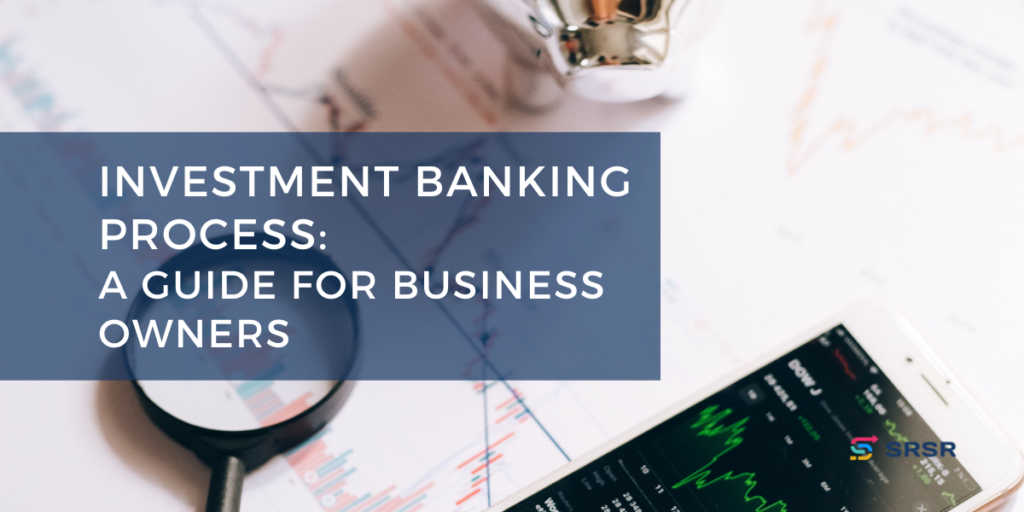Navigating the intricate world of finance and capital can be daunting for business owners. Understanding the investment banking process is crucial, whether you’re seeking funds to fuel your growth, exploring potential mergers and acquisitions, or looking for expert financial advice. This guide to investment banking aims to provide you with a clear understanding of how investment banks can become your strategic partners.
What is investment banking?
Investment banking refers to a specialized segment of the financial industry that provides various financial services to corporations, governments, institutional investors, and high-net-worth individuals.
Acting as intermediaries between those seeking capital and those looking to invest their funds, investment banks play a crucial role in facilitating the flow of capital. Investment bankers provide strategic advice and execute complex financial transactions including raising capital, mergers and acquisitions, trading and brokerage services, and more.
Learn more in our article on the latest trends in investment banking.
Investment banking versus commercial banking
In the case of investment banking, the name is misleading. Investment banks, after all, are not banks. They don’t collect money. They don’t loan money. Instead, they focus on providing licensed financial services and advisory help.
Commercial banks, on the other hand, provide traditional banking services. They accept deposits, lend money to individuals and businesses, offer checking and savings accounts, and manage day-to-day financial transactions.
Explore the differences between these two types of banking in our in-depth article: A Comparison of Investment Banking and Commercial Banking.
What is the role of investment banking in the economy?
Investment banking has many impacts on the economy. These financial institutions promote entrepreneurship, innovation, and economic growth by connecting investors and businesses seeking funds.
Investment banks also underwrite initial public offerings (IPOs), which help companies access public markets and attract investment. The infusion of capital from an IPO can enable companies to expand operations, invest in research & development, and create new jobs.
Investment banks advise companies on mergers and acquisitions (M&A) as well. M&A activity can drive improved efficiency and enhanced competitiveness, contributing to economic growth, industry restructuring, and job creation.
Further, as intermediaries between buyers and sellers, investment banks facilitate market liquidity. By ensuring that buyers and sellers connect, they support transaction efficiency.
Investment bankers’ in-depth research and analysis contribute to informed decisions and support market efficiency too. By offering products such as derivatives, hedging strategies, and insurance products, investment banks also provide risk management solutions that can help reduce market volatility. The financial crisis of 2008, though, demonstrates excessive risk-taking and lack of effective oversight can also lead to financial instability.
Nevertheless, investment banks help channel funds into productive investments, promoting business development, job creation, and overall economic growth.
Steps in the investment banking process

How the investment banking process looks for your business will vary depending on the objectives of your partnership with the financial institution. Still, several steps are common in developing a relationship with your investment bank’s financial advisors.
Initial meeting
First, you’ll meet with the investment banker to discuss your goals and objectives. The investment bank will provide an overview of its services. You may meet with several investment banks to determine the best fit for your business.
Plan investment strategy
After assessing your financial situation and objectives, the banker will outline how it might help your business. Developing a customized investment strategy typically involves analysis of your financial statements, market conditions, and industry trends.
Due diligence
Once you’ve agreed to proceed with a particular bank, the investment banker will conduct due diligence. This involves gathering and analyzing relevant information about your business operations. This deep dive helps the banker identify opportunities and challenges that may affect investment decisions.
Valuation and financial modeling
Next, the investment banker determines the value of your assets, such as securities, businesses, or other financial instruments. They will likely also do financial modeling (using the past and current expense and earning data) to anticipate how impending events or company decisions could impact the business and their investment decisions.
Structuring the service
Based on your objectives and their analysis, the investment banker works to structure a transaction that best suits your needs and maximizes value. This might be setting up an IPO, managing a merger or acquisition, making a deal with venture capitalists, or helping to reconfigure your business to enhance systems for greater efficiency.
Documentation
The investment banker prepares relevant documentation providing an overview of the investment opportunity, financial projections, risks, and other relevant information. This may be used in presentations to potential investors, industry contacts, and market researchers, depending on the nature of the deal.
Negotiation
The investment banker connects potential investors and buyers, conducts meetings, and negotiates the terms of the deal. Your investment banker works to secure your business with the best possible terms and price. There may well be an investment banker on the other side of the table trying to do the same for their client.
Due diligence by investors/buyers
Interested potential investors or buyers will want to perform their own due diligence. Your investment banker helps coordinate this by supporting a detailed review of your financials, operations, legal documentation, and any other relevant information.
Finalizing the transaction
After negotiations and due diligence are completed, your investment banker prepares legal documentation, coordinates with legal and regulatory authorities, and/or facilitates the transfer of funds or assets to close the deal.
Ongoing support
Depending on the specific transaction, your requirements, and the regulatory considerations, the banker may continue to support your business. This might mean monitoring investment performance, providing strategic advice, or assisting with post-transaction requirements.
Challenges in investment banking
The process of investment banking includes challenges and risks. For one thing, investment banking activities are highly influenced by market volatility. Interest rates, currency exchange rates, commodity prices, and overall economic conditions can all impact deal activity, liquidity, and investment profitability.
Investment banking is also heavily regulated. Failing to adhere to regulatory requirements can result in penalties, reputation damage, and legal consequences. In investment banking, reputation is a critical asset as the sector is highly competitive. This necessitates high ethical standards, transparent business practices, and robust internal controls.
Meanwhile, the industry, like many others, is experiencing significant technological growing pains. Investment banks have to learn to adapt to changing technologies, such as artificial intelligence, blockchain, and automation, to stay competitive and meet evolving client expectations.
Importance of investment banking for business

Investment banks and their services can benefit business owners. By helping you make informed financial decisions and exploring new opportunities, investment bankers can play a central role in growing your business and helping you meet your specific goals.
A business owner might turn to an investment bank for strategic advice and financial services in many instances:
1. You want to raise capital
Investment banks can advise you on the best financing options, such as issuing stocks or bonds, securing debt financing, or exploring alternative funding sources. Investment bankers can also help structure the offering, prepare the necessary documentation, and connect you with potential investors.
2. You want to better understand your business value
Investment banks are experts in business valuation. They can help you understand the worth of your business or specific assets, as well as your value drivers and potential risks. This can help you make better decisions regarding expansion plans or strategic partnerships.
3. You want to maximize your business value
Investment banks can provide guidance on potential merger or acquisition targets, conduct due diligence, evaluate deal structures, and assist with negotiations. They’ll help ensure your M&A transactions strategically align with your objectives and maximize value for your business.
4. You want a better understanding of your industry/market
Investment banks have extensive knowledge and expertise in various industries and financial markets. They do extensive research to provide valuable insights into industry trends and market conditions. They can help with competitor analysis, market positioning, and identifying potential growth opportunities.
5. You want to expand your network
Investment banking is relationship-driven. The banks establish networks with all sorts of buyers and sellers, including institutional investors, private equity firms, venture capitalists, and high-net-worth individuals. They can provide access to a wider network of industry contacts and strategic partners.
6. You want help navigating a complex financial situation
Investment banks offer financial advisory services tailored to your business needs. They can provide expert advice on various financial decisions, such as capital structure optimization, risk management, corporate restructuring, and capital allocation.
7. You want to bolster your regulatory and compliance expertise
Investment banks offer a thorough understanding of regulatory requirements and compliance standards to help ensure your business mitigates potential risks.
Next steps
Having demystified the investment banking process, this guide has aimed to empower your business with the knowledge and insights necessary to make informed financial decisions and unlock new growth opportunities. Explore further business opportunities involving investment bankers in our article The Role of Investment Bankers in Selling Your Business.

